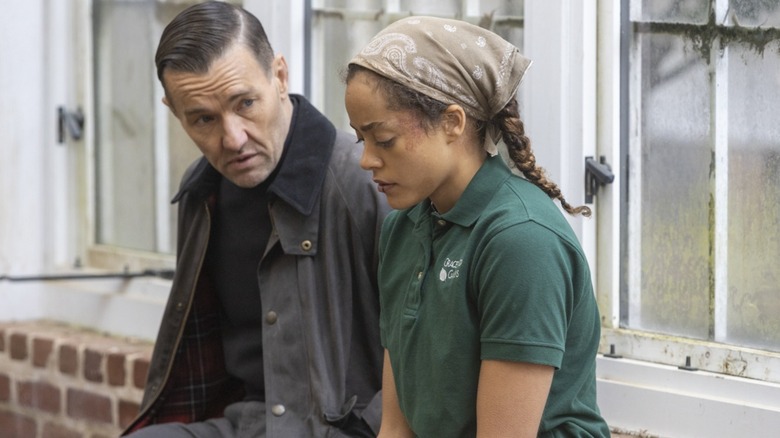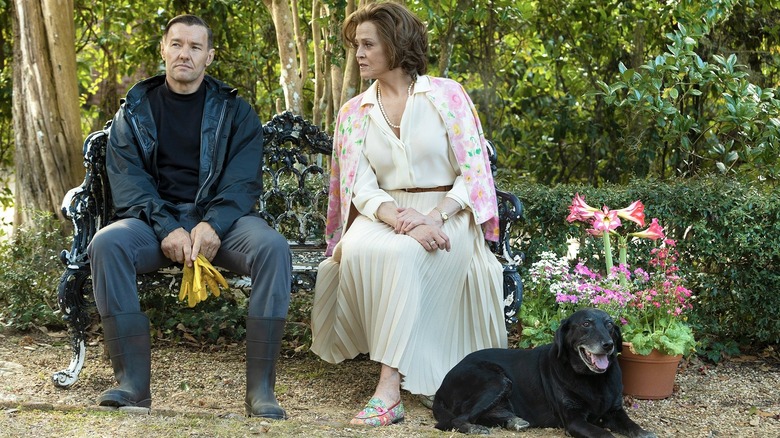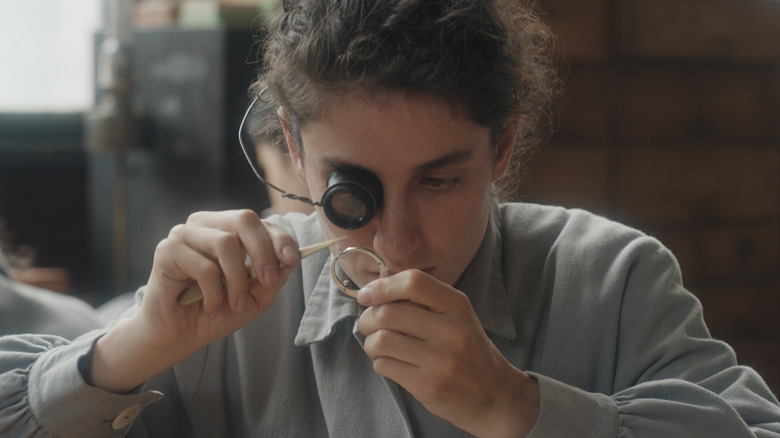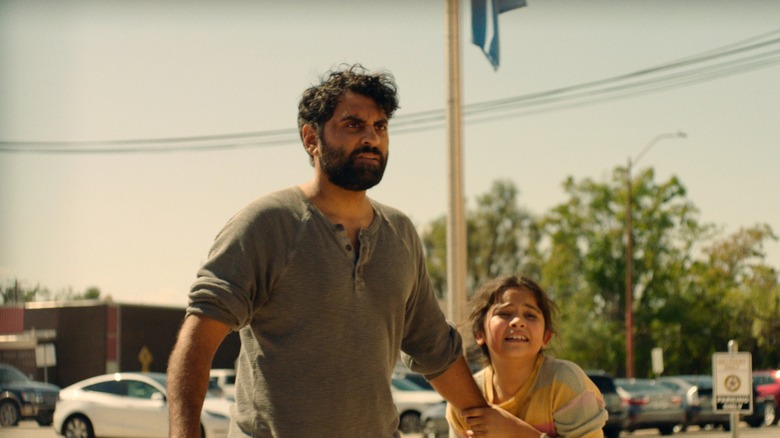Under The Radar: Paul Schrader's Master Gardener Concludes A Trilogy, Unrest Exceeds The Sum Of Its Parts, And More
(Welcome to Under the Radar, a column where we spotlight specific movies, shows, trends, performances, or scenes that caught our eye and deserved more attention ... but otherwise flew under the radar. In this edition: Paul Schrader is back and as provocative as ever with "Master Gardener," "Unrest" meets politics and philosophy in the middle, and "Land of Gold" puts a new spin on road trip movies.)
We should probably address the elephant in the room, right? The longer this writers' strike marches on, the clearer it becomes that we've reached a pivotal inflection point in this industry. Writers, the lifeblood of the entire moviemaking business, are rightfully fed up with a studio system that has progressively disenfranchised the most vulnerable (and irreplaceable) creative talent. As much as top-level studio executives forced the hands of writers through unfair wages, the insidious practice of "mini-rooms," and the worrisome possibilities involving A.I., many of the same issues also stand to complicate negotiations with both the Screen Actors Guild and the Directors Guild of America — potentially leading to an unprecedented scenario where all three unions shut down Hollywood indefinitely.
Obviously, such a hypothetical would leave creative talent, movie fans, and film journalists alike out in the cold ... but it should also go without saying that this would be small potatoes compared to our most vital artists receiving the assurances and security they're owed. Some things, after all, are more important than our entertainment. So what can we do? Those who live in Los Angeles or New York City can join picket lines, but even those who don't can send donations where they're needed most.
But we can also do what we've always done with this column: signal-boost the best, most exciting underseen efforts that demonstrate the value of writers everywhere.
Master Gardener poses the thorniest of questions
Writer/director Paul Schrader, the mind behind "Taxi Driver," "Raging Bull," and "The Last Temptation of Christ," has been exploring the darkest parts of the human psyche longer than most younger film fans have been alive, honing his skills and interests before unleashing arguably his three most fascinating directorial works yet: "First Reformed" in 2017, last year's "The Card Counter," and finally "Master Gardener." All three ping-pong between explorations of the most explosive political issues of our times, from climate change to the so-called War on Terror to the more recent, virulent strain of white supremacy prevalent in far too much of modern society these days. And as anyone who's had the misfortune of taking a gander at Schrader's Facebook page knows, perhaps few others are as equipped to tackle these issues as he is.
"Master Gardener," however, marks a stark departure from Schrader's typical mean streak. The film follows expert horticulturist Narvel Roth (Joel Edgerton, who is at the absolute top of his game here), a mysterious blank slate of an individual whose rigid bearing, telltale haircut and fashion sense, and perhaps overcompensating devotion to something as peaceful as plants all betray a much more disturbing past. But as we get drawn deeper into his small circle, starting with Sigourney Weaver's wealthy landowner Norma Haverhill and her estranged great-niece Maya (Quintessa Swindell, showing off incredible acting chops that she never got a chance to flex in "Black Adam"), the secrets of everyone's past threatens to be revealed. At the end of it all, meanwhile, lies a tantalizing glimpse of redemption.
The answers offered up by Schrader's latest will undoubtedly provoke and alienate but, as always, this filmmaker is far more interested in the questions.
"Master Gardener" is currently playing in theaters.
Unrest unpacks anarchy with clocklike precision
Try to imagine a politically-charged period piece taking place during the late 1800s about the merits of anarcho-socialism and you'll likely picture a war-torn epic documenting the bloody aftermath of revolutions. What "Unrest" offers instead is a much more nuanced and mischievous spin on the very specific effects of an international social movement on a small commune. Taking place around a watch factory in a secluded village in Switzerland, writer/director Cyril Schäublin's script takes a languid, deliberate, and deeply measured approach to weave its story about watchmaker Josephine (Clara Gostynski) meeting the real-life Russian philosopher and geographer, Pyotr Kropotkin (Alexei Evstratov).
Tasked with creating a new map of the region, Pyotr spends just as much time observing the people as he does places. As her factory bosses pinch and squeeze to maximize productivity, carefully timing each worker's efforts in constructing watches (likely with the exact stopwatches they helped build, to add insult to injury) and even going so far as to dictate which routes to take to and from work in order to cut down on minutes that could be otherwise spent on the factory floor, Josephine is introduced to downright radical ideas about time, money, and how much power workers truly wield ... even while she studiously goes about her craft. Cinematographer Silvan Hillmann's camera observes every scene with just as much patience, locked down with no movement at all as conversations unfold with impressively careful framing and blocking.
"Unrest" is a clever, dialogue-heavy portrait – almost literally so, given the arrival of a shiny new toy in the village called "photographs" — of life at a momentous period in history. Quiet and unassuming to the extreme, those on its wavelength will certainly be rewarded.
"Unrest" is currently playing in select theaters.
Land of Gold puts a new spin on the road trip movie
You know the drill by now. A jaded and cynical older man crosses paths with a rebellious, precocious young child. Neither can stand to be in the presence of the other for long, but circumstances force them into a prolonged journey together. By the end, each winds up learning valuable lessons from the other and even forges a familial bond. We've seen this well-worn trope before, and "Land of Gold" isn't interested in reinventing the wheel. But what it does do differently, however, comes from its refreshing choice to center on two brown people and explore the deeply specific and existential concern of how children of immigrants may not quite feel so fulfilled by the American dream they inherited from their parents.
The feature debut from writer/director Nardeep Khurmi certainly bears all the hallmarks of such, yet immediately cuts through any sense of aimlessness by virtue of the story's sheer urgency. We meet the exhausted and anxious Kiran (also played by Khurmi), an underachieving Punjabi truck driver, during a family celebration for his wife Preeti's (Pallavi Sastry) impending delivery of the couple's first child. This major milestone triggers Kiran's profound stress of bringing a daughter into the world without inflicting all the generational trauma laid down by Kiran's own father Gurinder (Iqbal Theba). Naturally, that's where the wayward stowaway Elena (Caroline Valencia) comes in. After accepting a last-minute job hauling freight across the United States, Kiran discovers the undocumented Mexican-American runaway hiding amid his cargo ... and so begins a harrowing and bittersweet journey taking them through the thick of America's racist heartland.
Driven by Khurmi's earnest performance and direction, "Land of Gold" reinvigorates a familiar formula.
"Land of Gold" is currently available to stream on Max.



